Table of Contents
TL;DR
- Most of us eat when we’re not hungry — we’re just stressed, bored, or avoiding life.
- Real hunger builds gradually and is satisfied by any food, even something boring.
- Fake hunger is sudden, emotionally charged, and always wants “a little something.”
- You can interrupt these snack spirals by understanding your patterns and swapping the reward.
The Lie We Tell Ourselves
“I’m starving.” – No, you’re not.
You just checked your email, hated what you saw, and now you’re standing in front of the fridge like it holds the meaning of life.
This isn’t physical hunger. This is brain-noise hunger — boredom, stress, habit.
And your metabolism is paying for it in blood sugar swings and creeping fat storage.
Hunger Isn’t Just a Feeling. It’s a Signal.
Real hunger = your body needs fuel.
Fake hunger = your brain needs a break.
But the signals overlap, which is why so many people confuse the two — and end up snacking their way into sluggishness.
Here’s how to tell:
| Real Hunger | Fake Hunger |
| Builds slowly over time | Hits suddenly |
| Feels physical: empty stomach, low energy | Feels emotional: stress, boredom, restlessness |
| Any food sounds good | Only snacks seem appealing |
| Happens every 3–5 hours | Happens after a meeting, during Netflix, etc. |
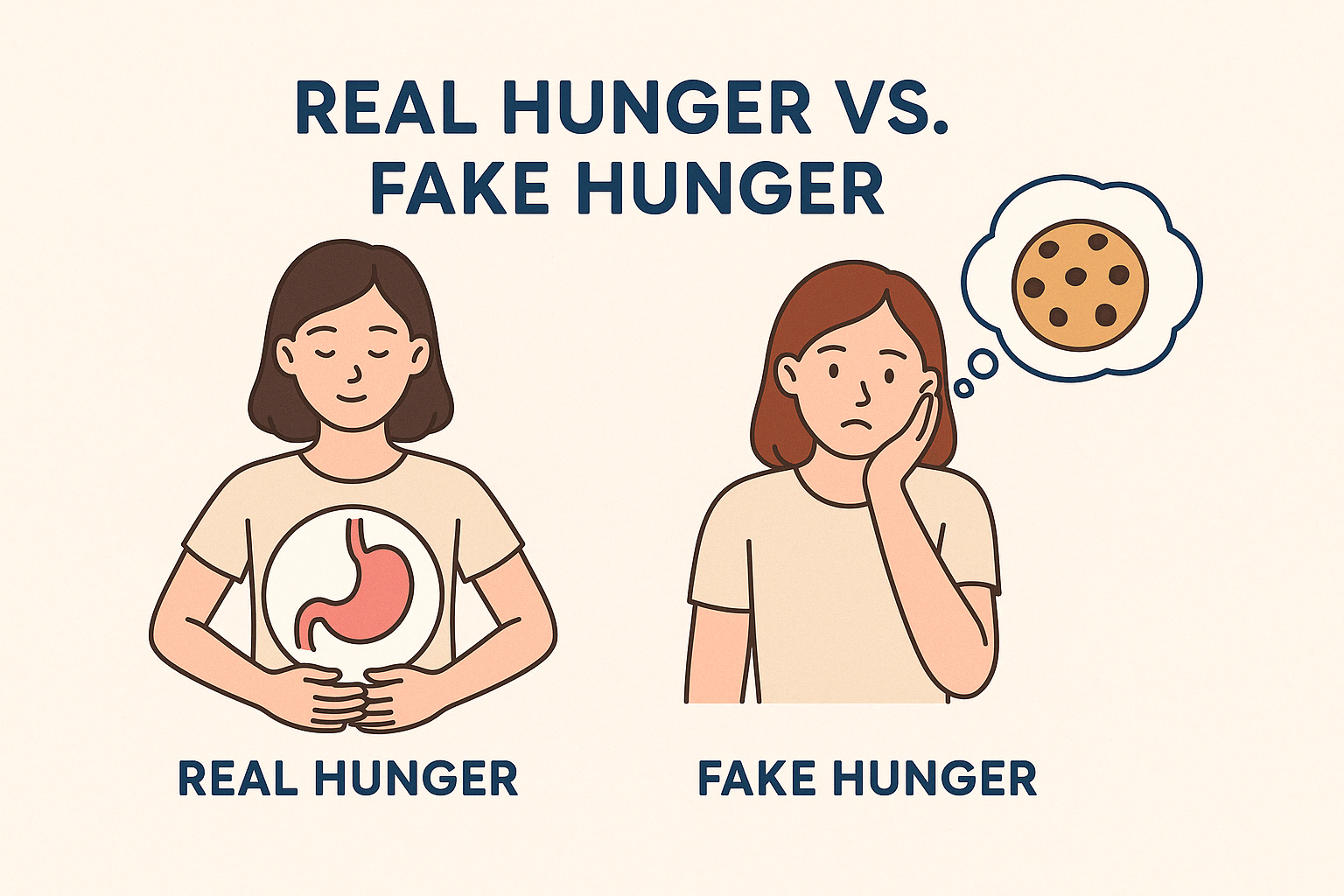
The Boiled Egg Test: Brutal, But Honest
Would you eat a plain boiled egg right now?
If yes: you’re likely actually hungry.
If no: what you’ve got is a craving dressed up in a hunger costume.
This works because cravings are picky. Hunger isn’t.
Why You’re Always “Hungry” — But Not Really
Let’s break down the usual suspects behind fake hunger:
1. Boredom
You’re not hungry. You’re just unstimulated. Eating gives your brain something to do.
2. Stress
Cortisol spikes appetite, especially for high-calorie comfort foods. Your body’s not hungry — your nervous system is fried.
3. Procrastination
You’re putting off something unpleasant. Food is a delay button with salt on it.
4. Habit Loops
You always snack at 4PM because… you always snack at 4PM.
The Feedback Loop That Traps You
- Trigger: boredom, anxiety, screen fatigue
- Brain: “Snack time!”
- You: reach for something crunchy
- Reward: dopamine hit
- Repeat loop tomorrow
Every snack you give into when you’re not hungry reinforces that loop.
Not because you’re weak — but because your brain’s just doing what it was taught.
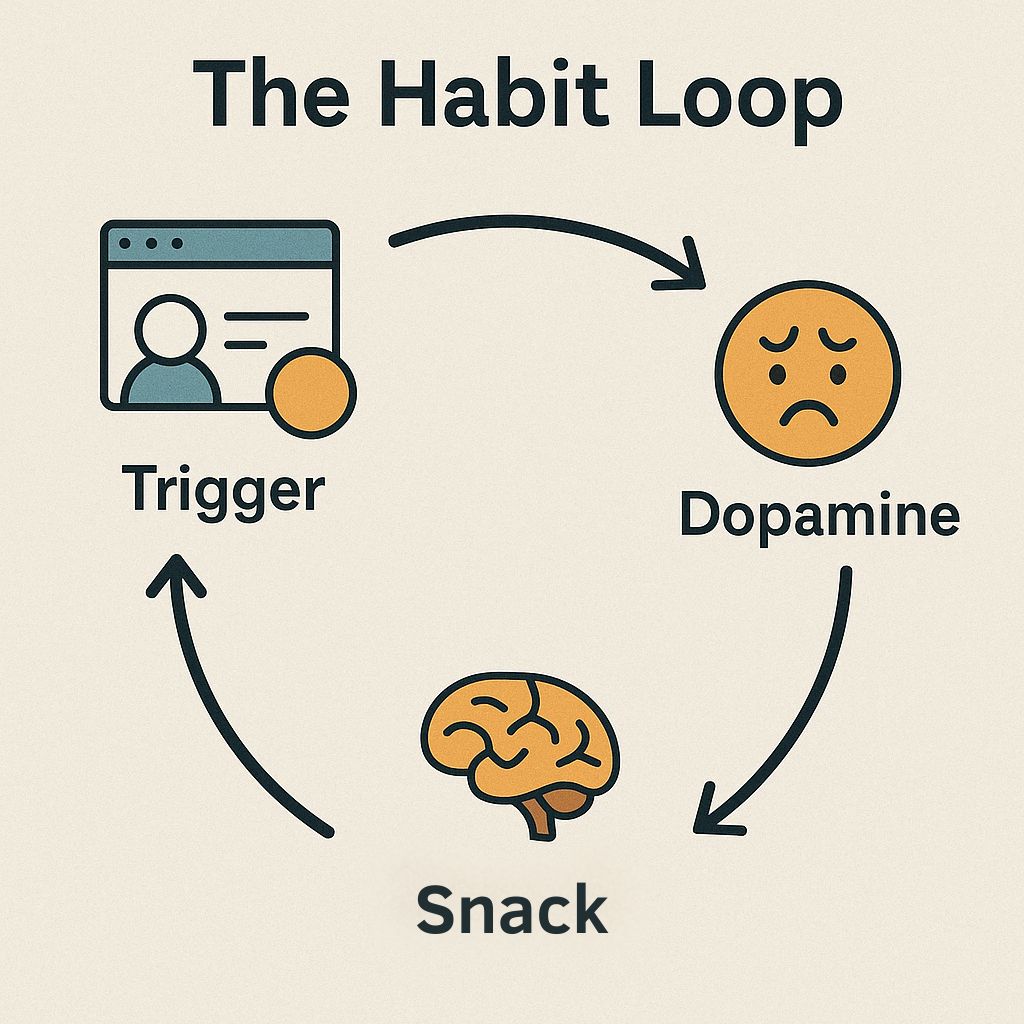
How to Stop Mindless Snacking (Without Going Cold Turkey)
The 10-Minute Rule
Set a timer. Tell yourself, “If I still want this in 10 minutes, I’ll eat it.”
You’ll be shocked how often the craving vanishes.
Drink Water First
Mild dehydration can mimic hunger.
Next time the Snack Monster growls, down a glass of water. Wait five minutes. Then decide.
Replace the Habit, Not the Reward
Your brain wants the dopamine. You just have to give it a cleaner source.
| Old Trigger | Old Action | New Habit |
| Boredom | Chips | 5-minute walk or music |
| Stress | Candy | Breathing reset or journaling |
| Screen fatigue | Popcorn | Tea or stretching |
Pattern Interrupts That Work
- Brush your teeth right after dinner
- Chew sugar-free gum while watching TV
- Move rooms when the craving hits
- Keep junk out of sight (or out of the house)
Build a “Craving Kit”
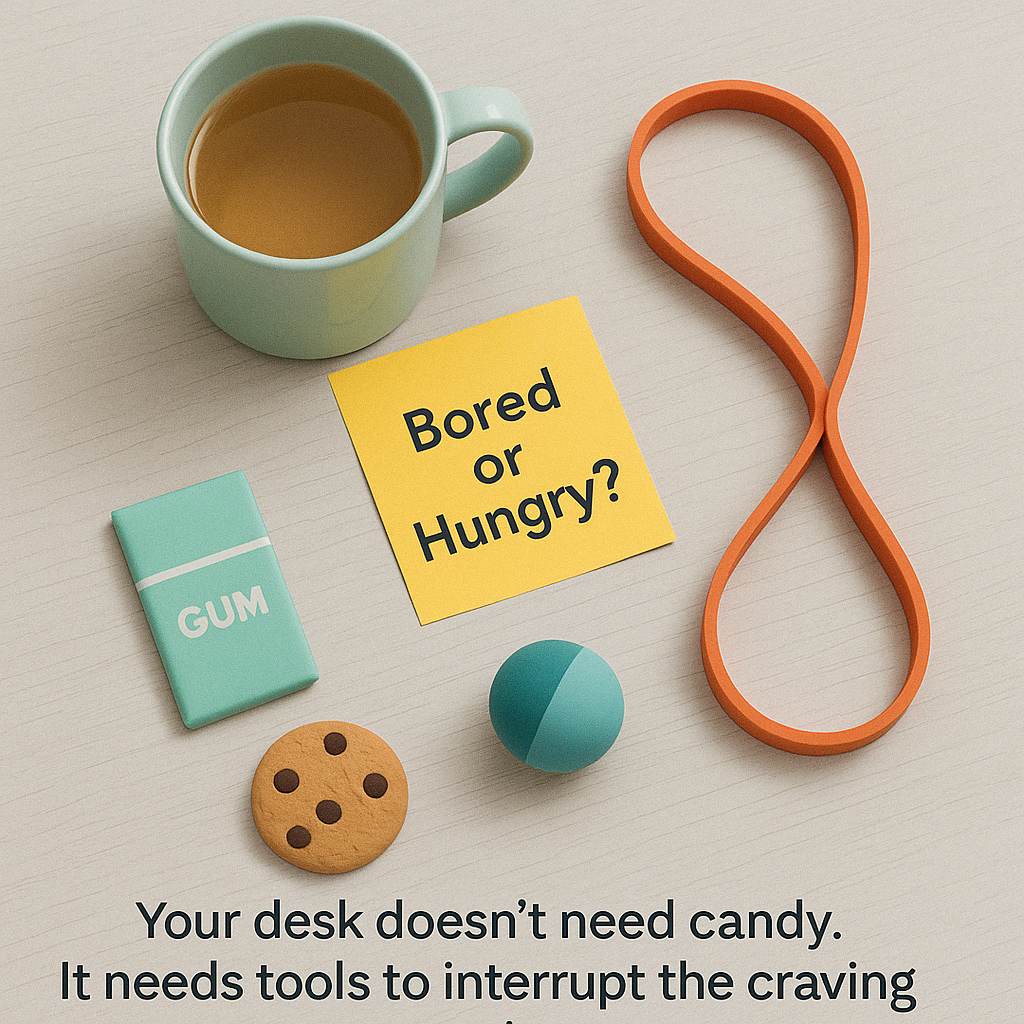
Put it next to your laptop or TV:
- Gum or mints
- Herbal tea bags
- A mini resistance band
- A sticky note: “Is this hunger or avoidance?”
Fake vs Real Hunger
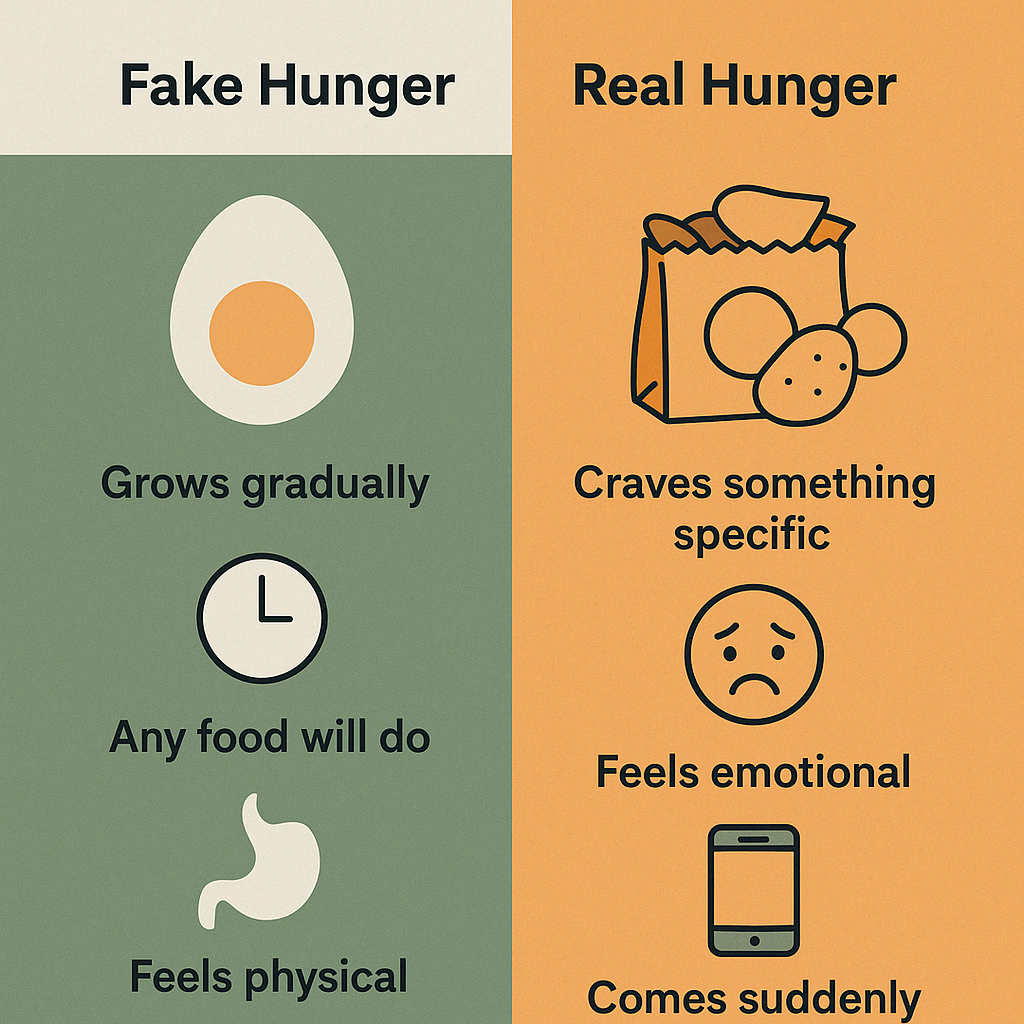
What If You Still Overeat?
Then you do.
You don’t need to punish yourself.
But don’t ignore it either. Ask:
- What was I feeling right before?
- Was I actually hungry?
- What could I try next time instead?
That turns a mindless moment into a learning one — and learning beats guilt every single time.
What To Eat When It Is Real Hunger
When you’re truly hungry, skip the ultra-processed bait.
Go for:
- Greek yogurt + berries
- Boiled eggs
- Hummus + raw veggies
- Mixed nuts
- Chicken breast + rice
- Protein smoothies
These won’t crash your energy or hijack your appetite three hours later.
Your Fridge Is Not a Therapist
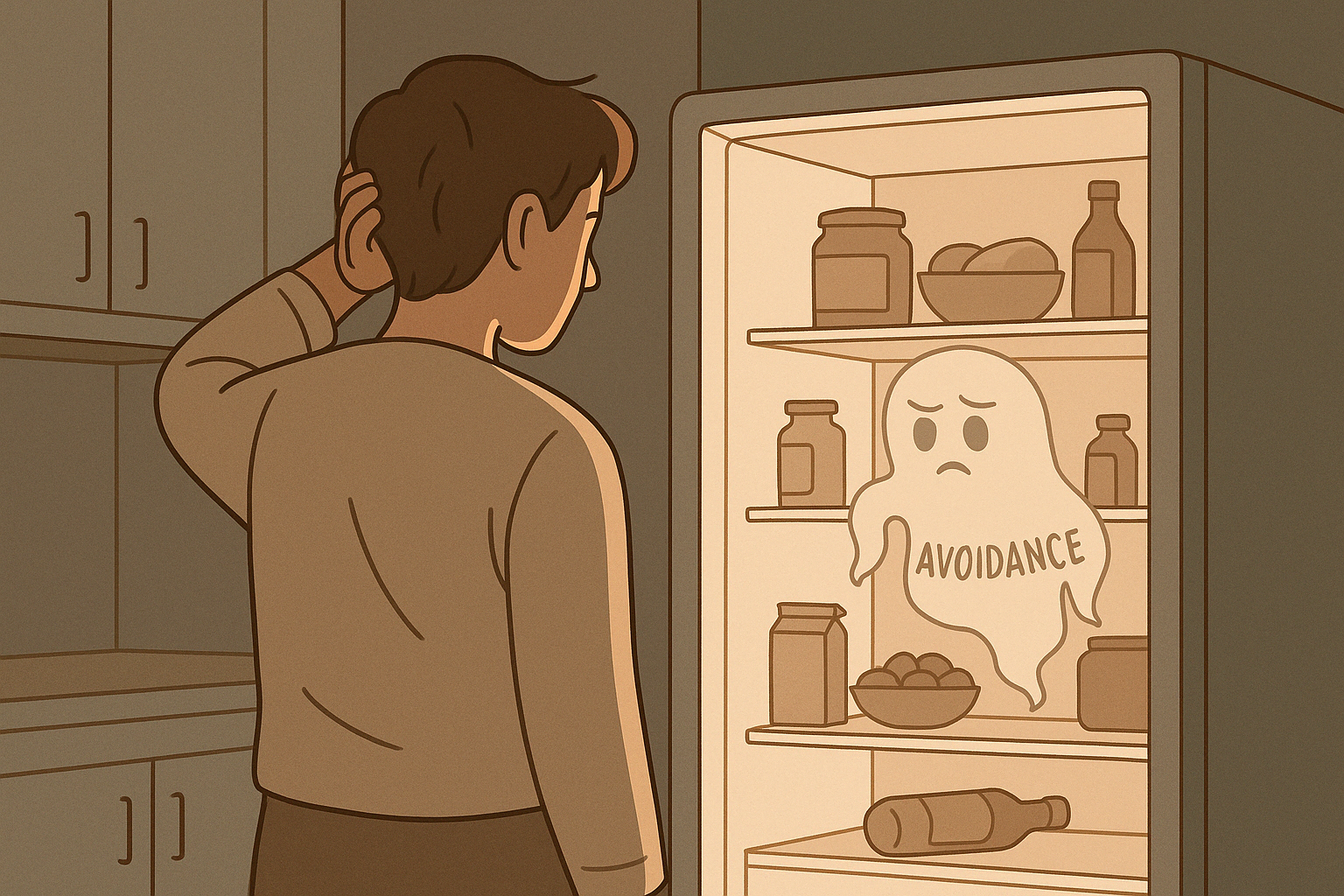
Final Note
You’re not weak. You’re not broken. You’re just doing what your brain thinks works.
The fix isn’t more willpower.
It’s seeing the pattern, questioning it, and changing the reward.
You eat to feel better.
So give your body what it actually needs — and let your brain catch up.
FAQ
Q: How do I train myself to tell real hunger from fake hunger?
Start by pausing. Do the boiled egg test. If you’d eat a plain egg or grilled chicken, you’re likely hungry. If you’re only craving chips, it’s emotional.
Q: Does this mean I should never snack?
No. Snack when you’re actually hungry or need fuel. The issue is mindless, repetitive eating that serves emotions — not your body.
Q: I eat when I’m stressed. How do I stop?
Create a stress ritual that doesn’t involve food — journaling, walking, deep breathing, or even venting to a friend. Stress eating is solved by emotional regulation, not diets.
Q: What’s a good snack that won’t sabotage my goals?
Anything high in protein and fiber: hard-boiled eggs, a handful of almonds, Greek yogurt, or hummus with cucumber sticks.
Q: I feel hungry all the time. What’s wrong?
You might be undereating protein, not sleeping well, or mistaking thirst for hunger. Track your meals and sleep for a week — then reassess.


